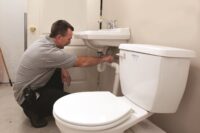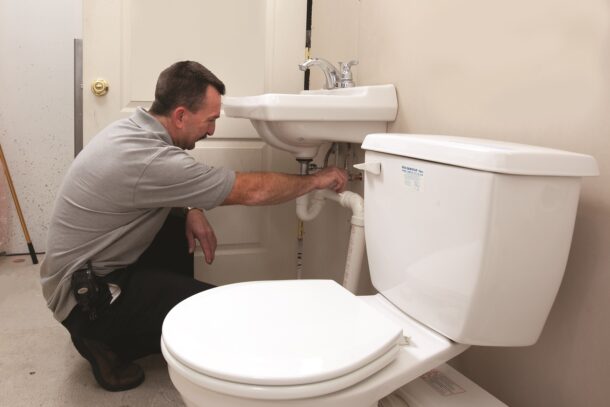When you’re a professional plumber, making a mistake can cost your reputation, not to mention your customers’ homes, dearly, so it is important you do everything you can to avoid those common errors that can spell disaster. In order to do that, let’s look at some common mistakes plumbers make, so you can hopefully avoid Read more
inventory managment

When you’re a professional plumber, making a mistake can cost your reputation, not to mention your customers’ homes, dearly, so it is important you do everything you can to avoid those common errors that can spell disaster.

In order to do that, let’s look at some common mistakes plumbers make, so you can hopefully avoid them in your working life.
-
Ignoring the Almighty Pressure Washer
First off, let’s give a big shoutout to pressure washing equipment, which is, as you should know, not just for cleaning driveways or graffiti off walls. No, dear friends, it’s also a pipeline’s best buddy. When faced with the Herculean task of clearing out years of sludge and grime from sewer lines, the pressure washer steps in like a hero. So, don’t ignore this powerhouse tool. Embrace it, cherish it, and for heaven’s sake, use it—because nobody likes a comeback story starring last year’s grease.
-
Skipping the Double-Check
Here’s a scene: You finish a job, pack up, and give a confident nod to your work—only to get a call hours later about a leak. The culprit? A connection you forgot to tighten. Always double-check your work. The five minutes you save by rushing off to your next appointment can cost you hours of return work and buckets of reputation points.
-
Tool Mismanagement
Raise your hand if you’ve ever used a screwdriver as a chisel. It’s okay, this is a safe space. But let’s be real: using tools for purposes they weren’t intended for is like using a loaf of bread as a doorstop—it might work temporarily, but it’s not a great idea. Respect your tools, and they’ll respect you back (and maybe save you from a mid-job meltdown).
-
The ‘Eyeball It’ Method
Precision in measurements is not just a fancy concept—it’s a cornerstone of good plumbing. “Eyeballing” pipe cuts or fixture alignments can lead to jobs that look more like abstract art than professional work. Always use the right measuring tools because, unlike horseshoes and hand grenades, close enough just doesn’t cut it in plumbing.
-
Forgetting Customer Service Skills
Remember, folks, plumbing isn’t just about pipes; it’s about people. The gruff, silent type might work for movie cowboys, but in the plumbing world, communication is key. Don’t just fix and flee. Explain what went wrong, what you did to fix it, and how it can be prevented in the future. A little chat can turn a customer into a repeat customer.
-
Neglecting Continuing Education
Plumbing technology evolves faster than many of us realize. If you’re still relying on techniques you learned decades ago, you might be missing out on easier, more efficient methods that could save your back and your bottom line. Keep up with the times and invest in ongoing education. It’ll keep you sharp and possibly introduce you to new gadgets and gizmos in the industry.
-
Underestimating the Cleanup
Last but not least, leaving a work site looking like a crime scene is a big no-no. A clean work area not only shows professionalism but also prevents those pesky “you left a mess” calls. Plus, who doesn’t love the sight of a spotless space post-job? It’s almost as satisfying as popping bubble wrap.
Keep these tips in mind, and not only will your pipes be flowing smoothly, but so will your business.

If there’s one certainty about the plumbing trade, it’s that it will be around for quite some time. Everyone needs plumbing utilities in their household, and the trade is impervious to AI interference and automation, at least for the foreseeable future. That said, this doesn’t mean challenges can’t make their way into your otherwise stellar Read more
If there’s one certainty about the plumbing trade, it’s that it will be around for quite some time. Everyone needs plumbing utilities in their household, and the trade is impervious to AI interference and automation, at least for the foreseeable future.
That said, this doesn’t mean challenges can’t make their way into your otherwise stellar operational planning. As plumbing services tend to service and maintain many difference clients over the course of their tenure in a community, they can be present for most future forecasted projects as well as emergency callouts – in other words they see properties at all sides of the maintenance lifecycle.
For this reason, it’s important for plumbing firms to be ready, present, and capable of dealing with issues as and when they arrive. In this post, then, we hope to discuss how to limit downtime in your plumbing business to help you prepare for the best possible future.

Inventory Management
It’s essential to keep close watch over your tools and categorize your equipment appropriately. Strong and easily-readable storage containers for pipes, u-bends, fixtures, and any other materials you need to carry from your warehouse or storage space must be in great condition, clean, and available for install, especially if you run emergency jobs. Stock rotation can also help you avoid installing outdated or damaged materials that will ultimately make a fantastic job much harder to deal with, or waiting on supplies that may be delayed.
Continual Employee Training
It’s difficult to experience the harsh surprise that everything in your service is ticking over well, but for a particular impromptu job, you haven’t the staff with the right authorization to attend to the client. That’s why it’s always important to integrate regular staff training into your development schedule, be that taking certification courses or adopting new installation standards. It will help you avoid suffering labor shortages or not being able to respond to an emergency situation, and it will also lower staff turnover over time. This will keep your organization the agile, robust enterprise it has the chance to be. There’s a certain confidence and pride that comes from this, and of course, your clients will appreciate your availability too.
Robust Equipment
Robust equipment is essential to invest in, from the toolboxes and secure locks you have in your van overnight, to the welding machines you might use to work on parts back at the workshop for use in your practiced trade. Of course, using equipment rated for more time than your own personal warranty guarantees can help you remain secure in the job you’re doing and how long your labor will last. This means you can better advertise your capability to a range of clients, including those with the most high-end needs. Remember, it’s always best to opt for better equipment that can be repaired and used for years than cheaper items that betray your craft and skill.
With this advice, you’ll be certain to limit downtime within your plumbing business at the healthiest possible level.
